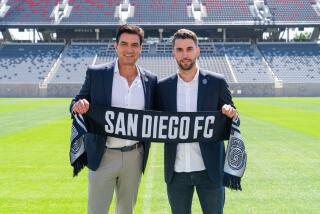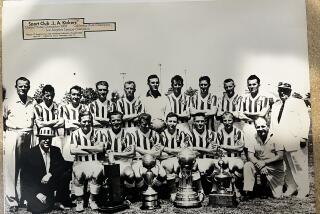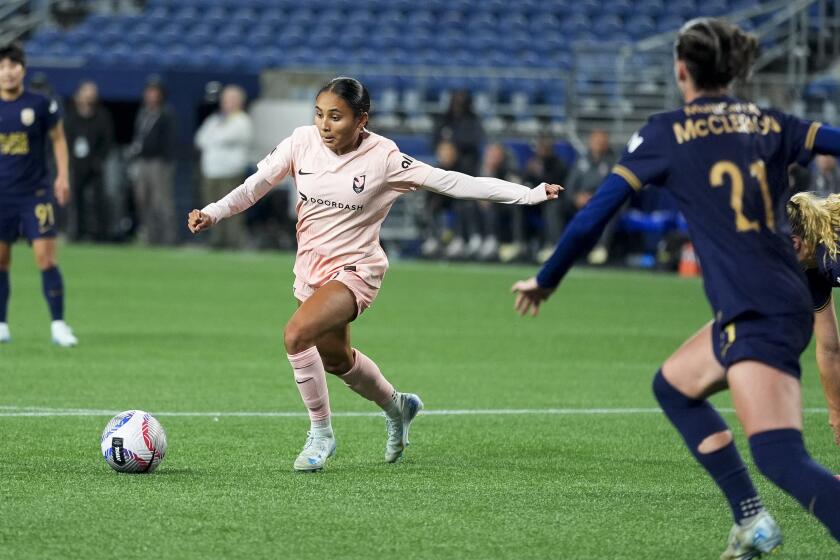For Him, American Dream Is Old-World Soccer Game
- Share via
Gabriel Cucuk is an American success story, an immigrant from Yugoslavia who entered the U. S. melting pot 30 years ago with two simple values:
1. Work hard and you will succeed.
2. Play soccer.
Cucuk has held fast to those principles, first in the machine shops of Milwaukee when he came to this country in 1956, then five years later in San Pedro where he was lured to play semi-pro soccer by a cousin.
You work hard. You play the same way. No difference for Cucuk.
The gentle man from the Dalmatian Coast, sponsor of the San Pedro Yugoslavs soccer club, expects the same from his team. When the Yugoslavs square off against the arch-rival San Pedro Croats this afternoon at 3 at Daniels Field, it should be a semi-pro soccer match like no other. They are the top two teams in the Greater Los Angeles Soccer League, considered by many to be the strongest semi-pro soccer league in the nation.
This season there is great hope among the Yugoslavs. They’re considered contenders for the national title for semi-pro soccer teams. Cucuk has worked hard to see that the team has the players to get to the finals, which take place in St. Louis in July.
“I want to go all they way,” he said.
But first the Yugoslavs need to get by the Croats this afternoon. The clubs are natural rivals, dating back to their conflicts in the old country, where different religious beliefs often cause friction between Croatian (Croats) and Serbian (Slavs).
“They don’t get along very well,” said Tony Morijon, president of the Greater L. A. League.
Actually, few of the players on either team today hail from Yugoslavia or even descend from there. The San Pedro Croat team counts most of its members from Hollywood and the San Fernando Valley. That has changed the nature of the rivalry some. But to international soccer buffs, the intensity is still apparent.
“There’s always a bit of friction between the two,” said Yugoslavs Coach James McConahee. “Some of the spectators are from the old country. They’re the ones that bring it (to the game) with them. It’s not a problem with the young players.”
Tension between the rivals upsets Cucuk, a Serbian who grew up in a Croatian neighborhood.
“In this country, the Croatians and Serbians are extremist groups,” he said. “Back home it doesn’t matter what you are.”
Cucuk, who budgets $40,000 a year on the Yugoslavs, is open in his dreams of his club winning the national semi-pro title. The team has been to the national cup championship game three times before, the last time in 1986. This season, promises Cucuk, the team will win it all.
“I won’t be ashamed to match this team with any professional team in Central America, South America or Canada,” he said.
The other day “the boss,” as they call him at the Torrance machine shop he controls with a partner, let go of one of his most prized possessions.
Cucuk’s son, Nick, who prepped at San Pedro High School, left town to play in a professional soccer league in Yugoslavia.
Nothing could have made the elder Cucuk--they call him “Gabe” around the soccer fields of San Pedro--more proud.
The telephone in his office rang the other day. A reporter from a newspaper in Belgrade wanted to talk about Nick. Cucuk excused himself and used his secretary’s phone to accept the call. After a five-minute discussion in his native language, Cucuk returned.
“They say Nicki is doing very good,” he said, a broad smile crossing his face. “He scored four goals in first game.”
Futbol , as the boss calls it, dominates most of the conversation around his Rancho Palos Verdes home. Nick is the first American-born player to play in a European professional soccer league. It is a dream come true for his father.
Dreams are what life is made of for men like Cucuk. Only he usually converts his to realities.
Like the goal he had since he was 14 to come to the United States. The Yugoslavian government refused his visa request in 1954. It took another two years to get one.
“I get it. I leave,” he said.
He returns home for a month each summer. It was through contacts in his hometown that Milan Ribar, the Yugoslavian national soccer coach, visited San Pedro last month and discovered Nick.
“They say he just needs some polishing and exercise,” Cucuk said.
The loss of Nick will hurt the Yugoslavs, but not significantly. Cucuk has given McConahee enough talented players to fill the void.
For starters, there is Ramon Moraldo, a former member of the national soccer team from Trinidad and sweeper for the Los Angeles Aztecs of the now-defunct North American Soccer League.
Then there is Lucky Temisanren, a 24-year-old native of Nigeria, an intense player with an easygoing attitude and sheepish smile.
There’s Chicago-born Marcelo Balboa, currently playing a U. S. traveling team in Guatemala. He hopes to return for most of the national cup play.
As assistant coach, the Yugoslavs have Novak Tomic, a former Yugoslavian world cup star and an original member of the old Los Angeles Toros of the NASL. Novak is also a salesman in Cucuk’s company, which makes precision aircraft parts for major aeronautic firms.
McConahee was a champion national youth soccer coach in Scotland.
“Gabe is a super person,” McConahee said. “He gives me the freedom to choose who to have on the team. He could tell me who to play, but he doesn’t.”
Cucuk believes in America. He points proudly to the fact that nine of the 16 players on the active roster are American-born.
“The purpose of this team is to keep young boys from South Bay together,” Cucuk said. “It’s better than running around on streets.”
Cucuk’s heavy Eastern European accent is offset by his disarming smile. He is a flag-waving patriot. Futbol and the American way. That is life.
“I love U. S.,” he said.
Put another way by Tomic: “Here is our country. We are going to die here.”
Over a lunch of squid and smelts at a San Pedro restaurant, Cucuk told a story that personifies his belief in America.
He came to the United States in 1956 and settled in Milwaukee with his father.
“I was machinist,” he said.
Two years later, a wave of layoffs hit the area and Cucuk lost his job.
“You know, I drive to Chicago. In one day, I find three jobs. If you want to work, there is work. I never been on unemployment. I never taken welfare.”
Cucuk says it’s important to keep that in mind when dealing with soccer players. So many good players, he says, lose interest in the sport because they need a job.
“You want to keep them, you train them,” he said.
Cucuk views the Yugoslavs team as an extension of his family. As many as eight players at a time have worked in his machine shop, a brick building adjacent to the Harbor Freeway near 223rd Street.
Today, two players have jobs at the plant. Temisanren has been there about seven months.
“Gabe has done so much for me. He’s like a father,” he said. “He’s helped financially and in every aspect of life.”
Cucuk is known for picking up the tabs at restaurants. But the players receive little renumeration for playing other than the satisfaction that success brings. About all they receive is gas money.
That doesn’t matter, according to Moraldo, because “When I die, I want to go to heaven as a soccer player. I don’t want to get a job.”
Attitudes like that, according to Tomic, have helped the club in the 20 years Cucuk has run it.
“If you don’t take care of your own kids, someone else will,” Tomic said.
“This is an excellent team. They’re special,” said McConahee. “Real nice people, very easy to coach.”
Cucuk and Tomic say soccer in the United States has improved greatly. They foresee the United States qualifying for the Olympic Games.
“Soccer is growing up, no question,” Tomic said. “There’s a real future here.”
But they say the country must do a better job of organizing the sport.
“The bureaucrats are killing us,” said Tomic.
He points to an National Collegiate Athletic Assn. rule that prohibits high school players from participating on club teams in the off-season before they go to college.
Cucuk thinks a good professional soccer league, composed mainly of native-born Americans, could survive if it were started on a regional scale, such as within California.
In addition, both he and Tomic say the large influx of people into Southern California from Mexico, where futbol is king, will eventually increase the talent pool.
“The door is always open for good soccer players,” Cucuk said.
A gold rope chain hangs around the neck of Gabriel Cucuk. Hanging from that is a custom-made gold charm. It reads: “100% Sibencani.”
“My hometown,” Cucuk said. “My wife had it made for me.”
Cucuk hasn’t forgotten the home country. But his life is in America now.






